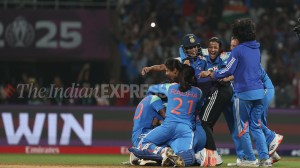Sepoy will hang for wife’s murder
April 30: The Bombay High Court today pronounced the death sentence on Vinayak Shivajirao Pol, sepoy in military service, who killed and di...

April 30: The Bombay High Court today pronounced the death sentence on Vinayak Shivajirao Pol, sepoy in military service, who killed and dismembered his wife in 1983.
The ruling is significant as it is the first time an accused has been convicted by the High Court after being acquitted by the lower court. A similar situation had arisen in Haryana a few years ago, but no such precedent existed in this state. Usually, accused move the High Court for acquittal against the lower court’s order. Pol was present in court today along with his second wife and two children. The division bench of Justice V H Bhairavia and Justice Ranjana Desai had already declared him guilty of murder and disappearance of evidence. He was summoned today to explain why he should not be awarded the “maximum punishment” for killing his wife and then disposing of her head, body and thumbs. “Maximum punishment” stands for either life imprisonment for 14 years or death by hanging. The court granted Pol 120 days to move the Supreme Court during which time he will be in jail. The judgment terms Pol’s crime “the gravest of grave and the rarest of rare cases knocking our judicial conscience”. The judges said, “We cannot keep our eyes shut to the fact that atrocities on women are increasing. And therefore such crimes need extreme penalty.”
They added, “We are not against the argument of philosophers and champions of human rights against capital punishment…but so long as it is on the statute book of penal law, culprits cannot take it for granted that the law is blind and helpless.”
The judges pointed out that Pol “enjoyed all liberties as a free man of society and we have been told that he remarried and settled in life.
Unfortunately, under the system of our judiciary, this appeal of 1983 came to be heard in 1997, after 13 years. It does not matter what greatness Pol achieved after the commission of the offence.” Pol eventually confessed to his crime and was tried before the additional sessions judge in Sangli. But the trial court acquitted him on the ground that the medical reports did not support his confession. They found that the injuries on Vimal’s body were ante-mortem and not “post-death” as Pol claimed.



- 01
- 02
- 03
- 04
- 05




























